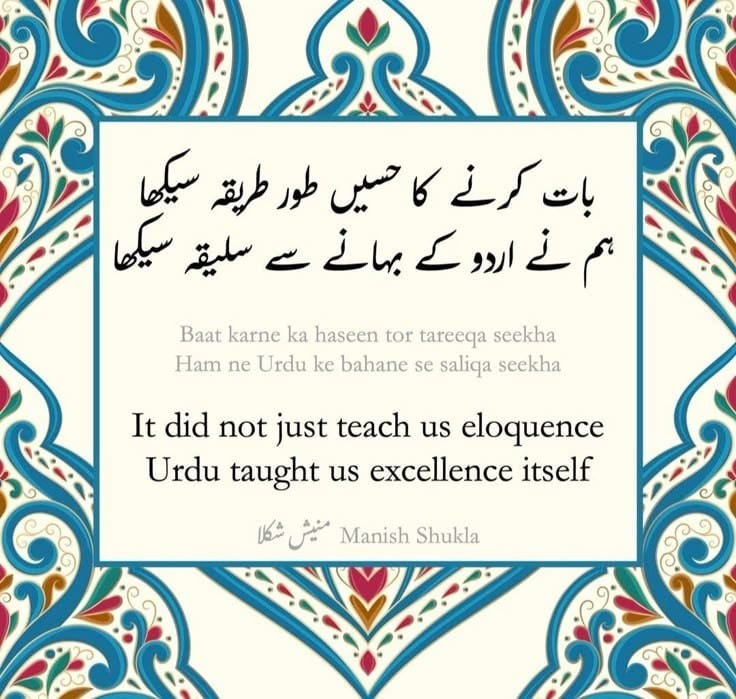“Kya masla hai, Bia?”
(What’s the problem, Bia?)
Baba reluctantly asks after my thirteenth episode that month. It was the two of us sitting on the dining chairs, with mama standing right behind him, patiently waiting for an answer to the impending question.
I tried to translate my emotions into makeshift Urdu alfaaz1, just to realize that… I couldn’t? It felt inherently impossible to talk to my parents in the broken sentences I managed to roll out of my tongue. The funny thing is, I am fluent in Urdu, it’s my first language and I’ve spoken it, for quite literally, my entire life.
Which is why, it came as a shocking revelation that I was entirely unable to translate my emotional withdrawal in the mother tongue I hold close to my heart. Throughout my childhood, whether it was watching Ben 10 on our satellite TV, or going to school in R. Uncle’s van, English has always been a close friend— so much so, that my mother made the fluency I possessed in English as an object of admiration in front of relatives.
Baba scolded me in English. The novels I read were in English, it was English that got me the most marks in school, the My Little Pony figurines collection I used to binge watch was in English, the language that connected and served as a bridge between my eight-year old self and YouTube. It was always my English teacher that I used to form a weirdly platonic bond with. Spelling bees, debate competitions, hosting assemblies, I did it all.
But, Urdu was home to me— it was a barrier between me and my Arab friends. It was warm and soft yet stern. So light, yet so heavy on the tongue. It gifted me a cultural identity that I missed whilst moving between countries. It was Urdu in which my dado2 used to whisper lories3 to me. Urdu, practically gave me a sense of self, it was a secret language me and my sister shared whilst living in Riyadh. Mere “home” couldn’t capture what it means to say “ghar”.
Yet, it feels so foreign to realize the psychological effects of using two distinct languages in entirely different scenarios. Tell me to write a six-hundred word paper on what life means to me in English? I’d write it with seventy different quotations. But to simply state the reason on why my feelings hurt when mama calls me a “badtameez4” in Urdu is beyond hard or mushkil5 at this point.
It’s incredibly fascinating to realize that languages alter and modify character. Needless to say that I have a completely different personality when I use Urdu, I am more soft spoken and feminine whilst speaking Urdu. On the contrary, I revert back into an angsty teenage girl through English.
To look at this from a politically psychological point of view, the reason why Urdu might be difficult to communicate individual feelings owes to the cultural practice of emotional withdrawal in Pakistani societies on a communal level. Even though Urdu poetry and literature hold an immensely treasured position in Pakistan today, you won’t find traditional Pakistani households using communication as a means of finding peace in everyday life.
I think in Urdu, but English translates it with the most precision— it’s as though I stand at the intersection of a Venn-diagram where Urdu and I share ‘familiarity’ but English and I share ‘accuracy’. Still, Urdu will be my favorite language.
In my defense, I had a vision at one point. Writing because not writing is scary.
Shukria for reading!
‘words’
‘paternal grandma’
‘lullaby’
‘ill-mannered’
‘difficult’






Truly commendable and phenomenal piece.
Just a couplet of Dagh Dehlavi came into my mind:
Urdu hai jiska Naam
Hamhi Jaante hain Dagh
Sare Hindustan me dhoom
Hamare Zaban ki Hai.
ah this is very relatable and also very well written, the trouble w expressing your emotions on urdu is SO real, and like you said, with the lack of emotional expression Pakistani Urdu-speaking society has, it's the same reason why a lot of people have difficulty expressing love directly in urdu, it is just way easier to say "I love you". I also saw somewhere that a lot of people avoid expressing emotions in their native language almost like a "mask" to hide what they truly feel because it is very overwhelming. so English is kind of that barrier. thank you for writing this, loved it very much <3